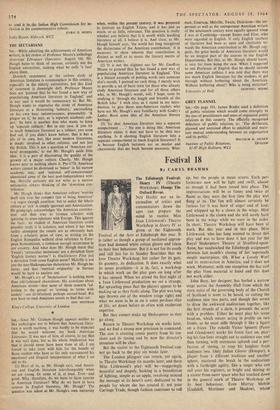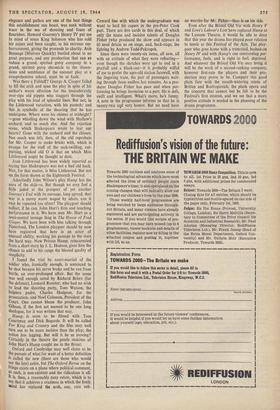Festival 18
By CARYL BRAHMS
The Edinburgh Festival: Henry IV (Theatre Workshop); Hamp; The Oxford Revue.
NOT Hazlitt nor an in- carnadine of critics and commentators down the ages can prepare the mind to receive Miss Joan Littlewood's Theatre Workshop in Henry IV as given at the Eighteenth Festival of the Arts at Edinburgh this year. It is rather as though a group of medieval appren- tices had donned white cotton gloves and taken to their, best behaviour. But it is not for its couth and still less for its Sunday flourishes that we love Theatre Workshop, but rather for iti guts, its goonery, its dedication. It does exactly what its name proclaims—it is in, fact, a workshop in which work on the play goes on long after it has opened. When we attend the first night of a Joan Littlewood production we see a strange, flat sprawling piece that the players appear to be making up as they frolic along. The plot was long ago thrown out of the window (stage right) and what we seem to be in on is some perilous slice of life, set down before us often with exuberant expertise.
But they cannot make up Shakespeare as they go along.
Return to Theatre Workshop six weeks later, and we find a strong new precision in command. The cast is creating comic poetry from its ten- sions and its timing and by now the director's intention will be clear.
But the visitor to the Eighteenth Festival can- not go back to the play six weeks later.
The London playgoer can return, yet again, to Theatre Workshop six months later, and there Miss Littlewood's play will be—staggeringly beautiful and shapely, basking in a benediction of lighting, simple as an apple, revolving around the message at its heart's core, dedicated to the people for whom she has created it; not your Carriage Trade, though fashion continues to roll up, but the people in mean streets. Each per- formance now will be light and swift, almost as though it had been tossed into place. The improvisations will be as funny and. twice as fluent as they were the first time the play was flung at us. The fun will almost certainly be furious for it was born of anger and of love, and whipped up by a clown in the wings. Miss Littlewood is the clown and she will surely have been in the wings while we were in the aisles. In short, Theatre Workshop will have been at work. But this year and in this place, Miss Littlewood, who has long wanted to direct this play and was to have done it last year for the Royal Shakespeare Theatre at Stratford-upon- Avon, has sandwiched the Edinburgh assignment between last month's closing of her supremely simple masterpiece, Oh, What a Lovely Wart and its resurrection in America, and it does not work. Moreover, with one exception she has cast the play from material at hand and this does not work either.
John Bury, her designer, has hurled a narrow stage across the Assembly Hall from which the stern voice of the governing body of the Church of Scotland is wont to be heard, so cutting the audience into two parts, and though this serves to draw the awkward auditorium together, like the first strands of a darn, it presents the actor with a problem. Either he must play his scene_ head-on, which means acting in profile on two fronts, or he must sidle through it like a figure on a frieze. The volatile Victor Spinetti (Poins and Glendower) works his frieze face on, play- ing his fun-lines straight out to audience one and then turning, with enormous aplomb and a per- fection of timing, to reap his laughter from audience two. Only Julian Glover (Hotspur), a player from a different tradition and another sphere, mastered the break in the auditorium with a forthright agility, like a singer who can sail over his registers, as bright and shining as a visitor from outer space who has touched down in the general murk of Theatre Workshop on its best behaviour. Even Murray Melvin (Gadshill, Mortimer and Shadow), whose '
elegance and pathos are one of the best things this establishment can boast, was sunk without trace in the sea of shouting and foam of flourishes. Howard Goorney's Henry IV put me in mind of some King Solomon who has sold his mines and been caught, to his extreme em- barrassment, giving the proceeds to charity. Avis Bunnage (Mistress Quickly) bustled about to no great purpose, and any production that can so reduce a grand, spirited gutsy company in a grand, spirited gutsy chronicle to the dimen- sions and semblance of the summer play at a comprehensive school, must be at fault.
Was there a Falstaff? George A. Cooper failed to fill the arch and span the play in spite of his author's warm affection for the immoderately over-ripe old pippin who staggers through the play with his load of splendid lines. But not, in the Littlewood variation, with his paunch; and this is symbolic of the shearing that he has undergone. Where were his chimes at midnight? —gone whistling down the wind with Shallow's orchard, and so much else. And the rejection scene, which Shakespeare wrote to tear our hearts? Gone with the orchard and the chimes. Not much was left, then, of the old reprobate for Mr. Cooper to make bricks with, which is strange for the stuff of the sack-swilling, cut- pursing, wicked old 0 is that on which Miss Littlewood might be thought to dote.
Joan Littlewood has been widely reported as saying that Shakespeare was not a bad old hack. Nor, for that matter, is Miss Littlewood. But not on the form shown at the Eighteenth Festival.
_Admittedly John Wilson's play Hamp has the aura of the déjà-vu. But though we may feel a little jaded at the prospect of yet another Journey's End with its message, long agreed, that War is a messy waste waged by idiots, can it ever be repeated too often? The playgoer should collect, if he can, John Hurt's firm and touching performance in it. We have seen Mr. Hurt as a semi-mental teenage thug in The House of Fred Ginger. We have been with him talking through Pinterland. The London playgoer should by now have registered that here is an actor of unusual ability, working his passage to the stars the hard way. Now Private Hamp, reincarnated from a short story by J. L. Hodson, gives him the chance to add to his range the blessed quality of simplicity.
I found the trial by court-martial of the soldier who, ironically enough, is sentenced to be shot because his nerve broke and he ran from battle, an over-prolonged affair. But the scene Was well enough acted by Richard Briers (for the defence), Leonard Rossiter, who had no wish to lead the shooting party, Tom Watson, the helpless padre, Charles Hodgson, for the Prosecution, and Noel Coleman, President of the Court. One cannot blame the producer, John Gibson, if the first act seemed to be one long duologue, for it was written that way.
Hamp is soon to be filmed with Tom Courtenay and Dirk Bogarde. It will be called For King and Country and the film may well turn out to be more incisive than the play; the action less lagging. But will it be as moving? Certainly in the theatre the gentle stoicism of John Hurt's Hamp caught me in the throat.
Oxford and Cambridge may well claim to be the parents of what for want of a better definition is called the new (there are those who would saY the late) satire, but The Oxford Revue on the fringe exists on a plane where political comment, as such, is non-existent and the ridiculous is all. It is, then, a reasonably zany estate, which is to say that it achieves a craziness in which the lively ntind has replaced the arch, coy, cute sub-
Coward line with which the undergraduate was wont to lard his capers in the pre-Peter Cook past. There are five cards in this deal, of which only the name and incisive talents of Douglas Fisher (who produced the show and appears in it) need detain us on stage, and, back-stage, the lighting by Andrew Todd-Pokropek.
Since there were twenty-six items, all new, all with an attitude of what they were reflecting— even though the sketches were apt to end in a pratfall and a black-out—it is probably wilful of me to prefer the ages-old station farewell, with the lingering train, the pair of passengers wait- ing through those endless last minutes. As a pro- ducer Douglas Fisher has pace and when per- forming he brings invention to a part. He is deft, swift and intelligent. What's more, he's funny. A note in the programme informs us that he is twenty-two mad very honest. But we need have no worries for Mr. Fisher—time is on his side.
Even after the Bristol Old Vic with Henry V and Love's Labour's Lost have replaced Hamp at the Lyceum Theatre, it would be idle to deny that this year the drama has played poor relation to music at this Festival of the Arts. The play- goer who goes home with a truncated, bashed-on Henry IV and with Hanzp's one outstanding per- formance, feels, and is right to feel, deprived. And whatever the Bristol Old Vic may bring it will be the work of a second-ranking company, however first-rate the players and their pro- duction may prove to be. Compare this good plain fare with the mouth-watering music of Britten and Rostropovich, the plush opera and the concerts that cannot but be felt to be the Festival's first interest, and we see that a more positive attitude is needed in the planning of the drama programme.



































 Previous page
Previous page